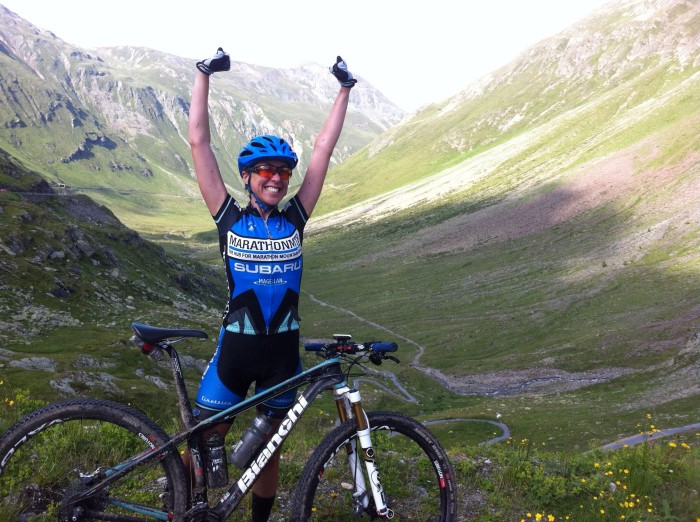Many of us compete in the same marathons again and again, trying to improve our performance each year (or maybe just beat our mates). That’s where some systematic goal setting comes in handy, if you’re looking for motivation to succeed.
Most of us don’t bother setting goals properly because, as marathon racers, we’re already intrinsically-motivated, disciplined, and determined – and we already know what we want to achieve. What’s more, the trusty old SMART goal-setting criteria we’ve learnt, whether in high school or at a corporate development day, is pretty obvious (and not that helpful) once you get the hang of it… So. Why bother?
Research shows that goal setting is a powerful performance enhancer, and doing it properly really will help you get your race legs and mental focus right. This post will help you understand more about different types of goals, and help you break them down until you can integrate them into your daily training.
20th in the World from the back line – I set a goal and worked towards it.
Basically, for sports there are three types of goals – outcome, performance, and process goals.
An outcome goal is usually a desired end result: ‘I’m going to win,’ or ‘I’m going to beat my mate Dave.’
A performance goal focuses more on something you can control, so: ‘I’m going to finish the 100km in under 4 hours.’ Or ‘I’m going to go 10 minutes faster than my time last year.’
A process goal looks inward: ‘I’m going to ride the whole way up “The Wall”’,’ ‘I’m going to clean every rock garden,’ or ‘I’m going to pedal smoothly through the sandy sections.’
While outcome goals can be very motivating (let’s take a moment to admit to ourselves that we imagine beating our riding buddies while we’re training) and almost entirely explain the success of Strava, they can also be really unhelpful, because they depend precisely on things we can’t control: others’ performances. They have been shown to provoke a lot of anxiety in athletes, without necessarily improving results.
Whatever level you race at, goal-setting is the most powerful way to improve your performance
Performance goals are better. They give you an absolute measure (like a time or score) against which to compare yourself. Goals like this are really great in sports psychology theory, but can be difficult to apply to mountain biking in practice. Mountain biking does not take place on a laid surface or track, and most race courses change from year to year – for example, the Camelbak Highland Fling will include a new section of singletrack in 2014 – and weather conditions (rain vs dust, hot vs cold), as well as trail conditions (recently graded vs chewed out) can make huuuuge differences to overall times, and are unpredictable. And let’s not even mention mechanicals, traffic on course and, heaven forbid, crashes.
But have a go by breaking your performance goals down into a few goals so they’re flexible enough to deal with the variability so characteristic of marathon mountain bike races.
A goal-setting example
Last year I did 5:16 at the Flight Centre Epic. It was really hot then and this year I have a lighter bike and the weather report is good.
I SHOULD be able to do 5:10.
I COULD do 5:00
I JUST MIGHT finish in 4:50
You might have a lighter bike (guess what: so does Dave) and the weather might be better, but if it’s better for you, it’s better for everyone. If you’ve got any chance whatsoever of achieving your ‘just might’ goal of racing the Epic in 4:50, (and maybe beating your mate Dave who did 5:05 last year), you’re going to have to break your race down, look at your weaknesses, and make it your business to improve them. Enter the process goal.
Focusing on the process can help you enter the flow state
In a technically and mentally demanding sport like marathon mountain biking, process goals really come to the fore, and are the most useful goals for improving performance, hands down. Where outcome and performance goals really are just expressions of your hopes and wishes (measurable and achievable ones, of course!), process goals are about focus and improvement and, importantly, are a powerful mental tool to block out the suffering and anxiety of a mountain bike marathon. They are also the gateway to the state we know as ‘flow’.
Make a SHORT list of some weaknesses:
This year I have a lighter bike, but it’s a hardtail and I’m used to a duallie.
Last year I lost time because I hunger flatted.
Immerse yourself in the process, almost like a mantra
Then think of some simple ways to address them, focusing of course, on process:
I want to ride smooth in the rocky sections to save time and avoid crashing.
I will make a nutrition plan and eat and drink regularly, even if I don’t feel like it.
Process goals can be used both during the race, and in training: think of them as the steps towards your bigger performance and even your outcome goals. Some are quite simple, and will depend on making a plan and ‘checking in’ with yourself again and again to make sure your mind isn’t wandering. Thoughts that keep you on track with your process goals might sound something like this (in your head):
Am I eating and drinking every 20 minutes? I will have that gel as soon as this techy bit is over. I will have the gel now. I will get it out of my pocket somehow and eat it now. It’s smooth here so it’s time to drink some fluid. In the feed zone I will fill up two bottles even if it takes a few minutes… And so on, for 5 hours if necessary.
For process goals that pertain to your physical activity on the bike – pedalling, steering, relaxing your joints, etc. aim to immerse yourself in them, almost like a mantra. Marathon MTB races are hard because they’re mentally taxing. Focusing on your process goals can be an effective distraction tool, as well as improve your performance. So, if your process goal is to ride smoother, when you hit the singletrack the monologue might go something like this:
Focus on the trail, pedal smoothly, look ahead, keep going. Focus on the trail, pedal smoothly, look ahead, keep going. And so on. For 5 hours if necessary.
Remember to keep this internal monologue focused on these processes, even if you stuff up. Negative self-talk is a big performance inhibitor so just bring it back to your process goals. Again and again if you have to.
You also need to practise your process goals. Set a couple of ‘training performance goals’ around your process goals to make sure you get the right preparation in.
I’m going to ride off-road three times a week instead of once, and I’m going to visit the race track twice to practise the rocky sections (Dave is not invited).
I’m not going to let myself hunger flat on any training ride before the big race by taking extra food and drink, and eating every 30 minutes on every ride.
Sometimes just finishing is a big enough goal
Remember that mountain bike marathons are long, tough races – a lot is out of your control, and a lot can go wrong. If your race isn’t going well and you stick to original performance or outcome goals, you’ll end up riding with the heavy burden of feeling like a failure, which will make you go slower, I promise. If you crash or have a mechanical, or even just a really bad day, take a moment to compose yourself and set a new goal – and this could even be as simple as getting to the finish and keeping focused on those process goals of riding smoothly and getting nutrition right. Sometimes just finishing can be a very motivating ‘outcome goal’ when you’re having a crappy day. And it can be a lot to be proud of.
Goal-setting is a cycle – so, no matter what happens on the big day, remember to evaluate and get started on the process again. That’s how you, and the best athletes in the world, improve and get results.

